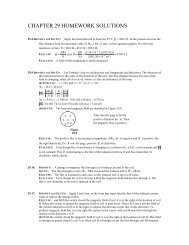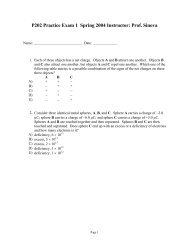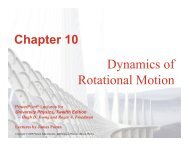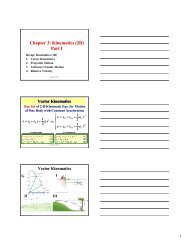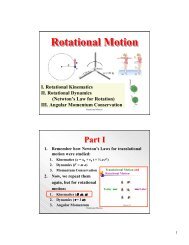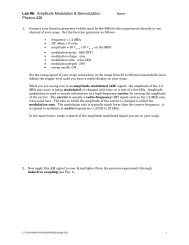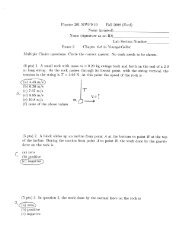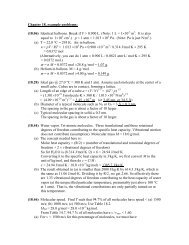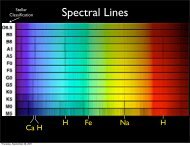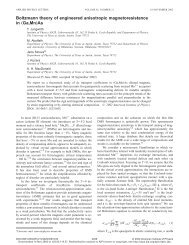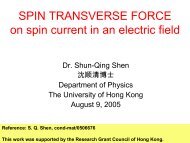1 of 3 Syllabus for PHYSICS 218: Mechanics Fall 2010 - Texas A&M ...
1 of 3 Syllabus for PHYSICS 218: Mechanics Fall 2010 - Texas A&M ...
1 of 3 Syllabus for PHYSICS 218: Mechanics Fall 2010 - Texas A&M ...
Create successful ePaper yourself
Turn your PDF publications into a flip-book with our unique Google optimized e-Paper software.
<strong>Syllabus</strong> <strong>for</strong> <strong>PHYSICS</strong> <strong>218</strong>: <strong>Mechanics</strong><br />
<strong>Fall</strong> <strong>2010</strong><br />
Sections 505-508<br />
<strong>Texas</strong> A&M University<br />
Welcome<br />
Welcome to Physics <strong>218</strong>! This is the 1st semester <strong>of</strong> an introductory course in Physics. Physics is the basis <strong>of</strong> modern<br />
science and technology. <strong>Mechanics</strong> and Astronomy in particular were the starting points <strong>for</strong> a mathematical description <strong>of</strong> nature<br />
several hundred years ago. Whether you want to calculate the trajectory <strong>of</strong> a spaceship to Mars, construct a bridge that does not<br />
collapse, or understand why a baseball curves, you need <strong>Mechanics</strong>! I cannot promise that you are ready to send a ship to Mars<br />
after you passed this course, but you will have acquired some very useful knowledge about nature that will help you in your future<br />
career as an engineer or scientist. This introductory physics class will also teach you some basic skills needed in all fields <strong>of</strong><br />
science and engineering. This includes problem solving strategies, analytic thinking, and the ability to contribute in a scientific<br />
discussion.<br />
Co-requisites:<br />
Instructor:<br />
MATH 151. You are expected to have a working knowledge <strong>of</strong> plane geometry, trigonometry, and algebra. As<br />
the semester progresses you will also be expected to have a working knowledge <strong>of</strong> derivatives and integrals,<br />
and be pr<strong>of</strong>icient in the use <strong>of</strong> vectors (addition, subtraction, dot and cross products.<br />
Pr<strong>of</strong>. Alexei N. Safonov<br />
Office: MIST M319 Phone: 979-845-1479 E-mail: safonov@tamu.edu<br />
Office hours:<br />
Web Page:<br />
Wednesday 3:30 – 5:00 pm or by appointment<br />
http://faculty.physics.tamu.edu/safonov/<strong>218</strong> (your instructor’s page)<br />
http://physics<strong>218</strong>.physics.tamu.edu (course-wide departmental web-page, contains<br />
<strong>for</strong>mula sheets, and other useful info)<br />
Required Material: Textbook: - “University Physics”, 12th ed. By Young and Freedman<br />
Lab Manual: - “Laboratory Experiments <strong>for</strong> Physics <strong>218</strong>", 9th ed., by Ramirez, Seidel, and<br />
Hiebert (Hayden-McNeil Publishing)<br />
Other: - CPS clicker, needs to be purchased and requires registration online (see below)<br />
- Mastering Physics packet to access online homework, more details below<br />
- A simple scientific calculator (capable <strong>of</strong> calculating arithmetic and trigonometric<br />
functions). Programmable calculators or electronics devices with calculator functions<br />
will not be allowed during exams.<br />
Class times: MW 5:45-7:00PM in MPHY 205<br />
Recitation /Lab: Recitation meets in MPHY 234 or 335, Laboratory meets in MPHY 234 or 335. No Lab sessions or<br />
Reports will be dropped. Recitation and Lab will meet during the 2nd week <strong>of</strong> the semester!<br />
Students retaking the course should contact the Physics Front Office (window at the entrance on the 1 st<br />
floor <strong>of</strong> the MPHY building) immediately in order to get credit <strong>for</strong> Lab if passed in a previous semester<br />
with a grade <strong>of</strong> 80 or better. If the permission is granted, these students will not have to repeat the Lab<br />
but they will be required to attend Recitation and take weekly quizzes.<br />
Homework: Homework assignments will be done mostly online via Mastering Physics<br />
(http://www.masteringphysics.com). If you have purchased a new book, the MasteringPhysics packet<br />
is likely included with the book. If you have purchased a used book, you can buy the MasteringPhysics<br />
packet at the bookstore OR you can sign up online with a credit card. You will have to log in and<br />
enroll to use this program, see a separate instructions sheet attached to this syllabus. You will need to<br />
obtain a score <strong>of</strong> at least 70% average on the homework section <strong>of</strong> the class in order to pass this class<br />
(note that multiple attempts or late submission will lead to diminished or no score credit).<br />
Lectures:<br />
You will be required to study the material <strong>of</strong> each chapter in your textbook be<strong>for</strong>e it is covered in the<br />
lecture. To facilitate this, there will be graded Lecture Quizzes covering the material <strong>of</strong> upcoming<br />
lecture, typically at the beginning <strong>of</strong> the lecture (you will need to have a registered CPS “clicker”).<br />
1 <strong>of</strong> 3
Clickers:<br />
Exams:<br />
Exam Grade:<br />
Course Grade:<br />
These assignments will typically have 2-3 multiple choice questions or short problems on the material<br />
to be covered in the lecture. Hints on the content <strong>of</strong> the quizzes will be announced at one <strong>of</strong> the<br />
previous lectures. Your quiz scores will contribute to your final grade. Additionally, there will be other<br />
unannounced pop-quizzes (you will need to have a registered CPS “clicker”) during the lectures, some<br />
<strong>of</strong> them may be to test your understanding <strong>of</strong> a topic and will not count <strong>for</strong> grade, others will<br />
contribute to your final grade.<br />
You will need to purchase a CPS clicker and register it via elearning.tamu.edu (log in with you neo<br />
account, select this class, click on the “Course Content” and follow the link to register). DO NOT<br />
register it by directly going to the manufacturer web-site (cpsonline.com or einstruction.com)!!!<br />
There will be three midterm exams and one final exam.<br />
(a) Each exam will generally consist <strong>of</strong> problems similar in content and difficulty to the homework.<br />
The entire solution will be graded and partial credit given if merited. Your work must show steps<br />
toward the solution; the answer alone is not sufficient. The grader will judge your use <strong>of</strong> physics in<br />
arriving at the solution. Exams may also include examples worked in the lecture but not appearing in<br />
the text nor assigned as problems.<br />
(b) Formula sheets will be provided <strong>for</strong> each exam and the final.<br />
(c) If you miss an exam due to an authorized excused absence as outlined in the University<br />
Regulations, then you should attempt to contact me prior to the exam, but no later than the next<br />
working day following the missed exam to arrange <strong>for</strong> a makeup exam. There may be a single coursewide<br />
makeup exam <strong>for</strong> those missing an exam. This makeup exam will be written by a committee <strong>of</strong><br />
Physics <strong>218</strong> lecturers and administered outside normal class time within 7-10 class days following the<br />
missed exam. Note: Very few conditions qualify as an authorized excused absence, so avoid missing<br />
an exam at all costs.<br />
(d) You must bring your student ID with you to all exams <strong>for</strong> identification purposes.<br />
Exam grades will be curved depending on special conditions <strong>of</strong> a particular exam. In no case will a<br />
curve result in a lower letter grade than the standard 90-100% A, 80-89% B, 70-79% C, 60-69% D,<br />
and



